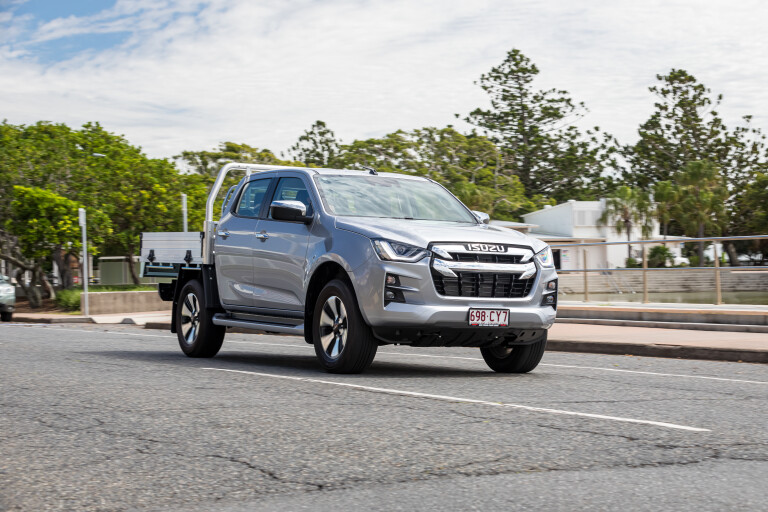
Score breakdown
Things we like
- Increased GCM
- Walk away door lock (key stays in pocket at all times now)
- LSU luxury with tough alloy tray
Not so much
- Reversing camera a bit vague with alloy tray corners
- Firm rear when unloaded
I didn’t actually get as much seat time in the 2022 Isuzu D-Max LS-U Cab-Chassis as I’d have liked, because for the most part, it sat at a mate’s house out of harm's way. Harm's way, you ask? Brisbane was hit by that savage flood, which happened to engulf my house as one of its 20,000 residential victims.
The D-Max made it out before the water reached its tyres, along with a couple of my other pride and joys. The house, however, and its contents, were gone. I actually found some spare track car wheels five doors up, in someone’s front yard. Better the wheels than a brand spanking D-Max.
By the time the D-Max was back with me, it was put to work doing cleanup at my house, my neighbours’ houses, and we even used it to do food runs for those who had lost their rides to the cocktail of sewage and Brisbane River water – so it smelt like pizza for a good portion of the testing.
My neighbour’s freshly restored Kingswood was one of the four-wheeled victims we couldn’t save in time, but as he so stoically put it, “I restored it once, I can do it again!”
A fresh-faced D-Max with all but 1000km on it didn’t feel particularly suitable for muddy cleanup efforts, but the alloy tray meant we weren’t trashing it and a good gerni had it looking new again. The timing really couldn’t have been better.
UPDATE, October 2022: MY23 D-Max pricing announced
The updated 2023 D-Max has been detailed, with tweaks to styling, equipment and engine options. Get the full story at the link below. We'll be driving the updated models as soon as they reach Australia, but mechanically they're largely unchanged.
Story continues
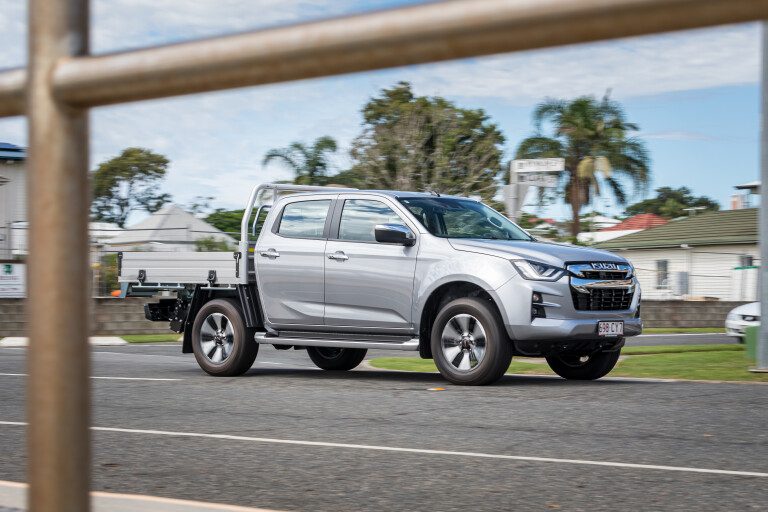
The 550 kilometres we spent in this D-Max were high stress and it wasn’t babied. Oddly, though, it returned similar fuel use figures to what we usually get from D-Maxes, chugging a respectable 9.1L/100km. Mind you, the sheer number of traffic lights out meant a clean run on just about every drive – a rather post-apocalyptic experience of taking intersections into your own hands.
There’s nothing more suitable than a dual-cab 4x4 ute in situations like the one we were faced with, especially one with a sizeable alloy tray. So despite spending less time behind the wheel than usual, none of its use was mundane.
The updated 2022 D-Max range offers more than just mild visual tweaks, with an all-new LS-U+ variant to bridge the gap between the mid-range LS-U and range-topping X-Terrain, the addition of LS-M and LS-U cab-chassis models, and the return of space cab options.
I tested a space cab D-Max long-term in 2018 and loved it, happily sacrificing rear-seat space for more tray length – so the move to bring the model variant back is one I (and no doubt many tradies, too) applaud.
As well as more choices, the latest generation D-Max range brings more tech, and most critically, more overall carrying capacity thanks to a GCM that jumps from 5,950kg to 6,000kg. All of these range updates actually came ahead of schedule, too. Hats off to Isuzu Ute Australia because, in a delay-ridden pandemic-stricken world, we’ve grown so used to waiting that it seems unusual when deadlines are met ahead of time.
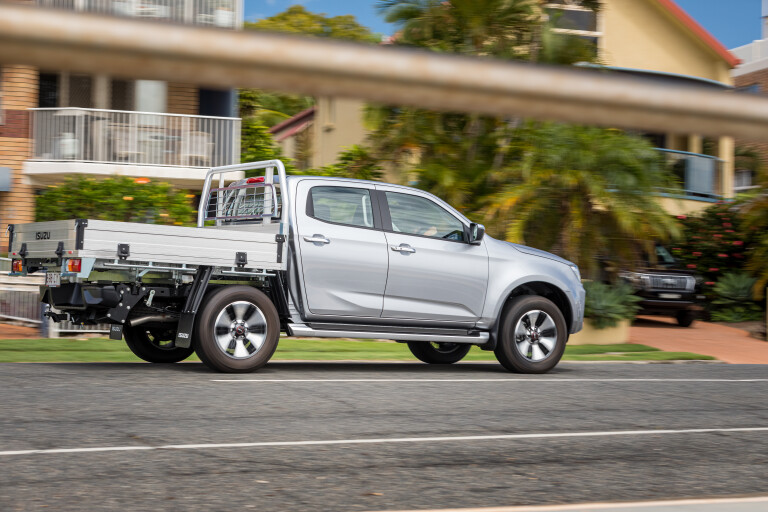
There have been a couple of price hikes, although the range-topping X-Terrain scored an introductory ‘special’ drive-away price of $62,990 (up to $67,500 before on-road costs after the introductory offer wraps up) down from last year’s $63,900. And Isuzu says it will honour prices for orders placed before the April 1 increase.
Our cab-chassis LS-U tester starts at $59,500 without extras and before on-road costs, which is a smidge less than the $56,100 style-tray automatic LS-U but for those who choose the alloy tray, it’s usually utility rather than price that sways the decision.
It's a more expensive ute than the previous-gen D-Max but you do get greater levels of technology and GCM increase across 4x4 models. With just $1,090 between the new LS-U+ and top-spec X-Terrain – for those that took advantage of the special introductory offer – it would have felt like a no-brainer to buy up.
My last D-Max experience was spending a few months with the new 1.9-litre SX, which felt similar in many ways but definitely didn’t match the grunt of the 4JJ3 3.0-litre engine. The extra torque never hurts, and while it’s not the most powerful in its class, the big donk lazily gets the job done without strain or excessive revs. I still feel the D-Max could do with an extra gear or two, as has been mentioned before, but this engine works just fine with a six-speed automatic.
It really is quite impressive to think the D-Max still uses much the same engine it debuted with in 2008. We’re not knocking it, because it’s a good thing
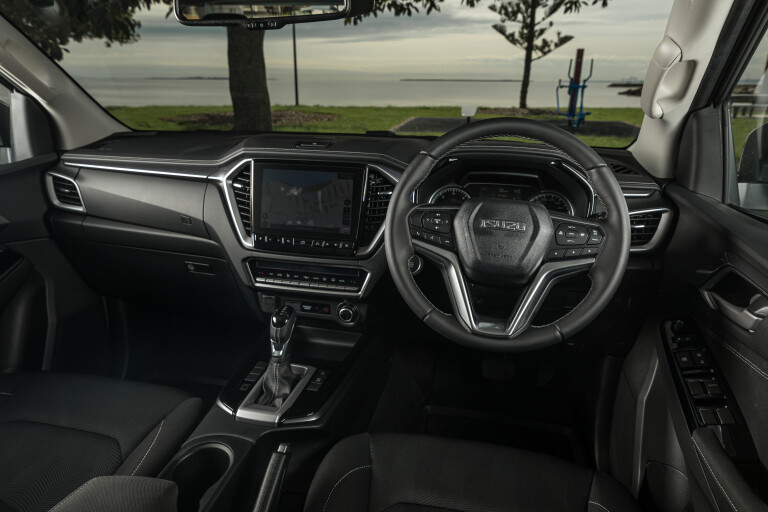
The long-serving 4JJ3 received a major overhaul last year, resulting in a 10kW/20Nm performance jump and a far more useable torque band. It wasn’t just a better turbo and some mapping changes, either. Isuzu developed an all-new new engine block, crankshaft, cylinder head and lightweight aluminium pistons. An electronically controlled variable geometry turbo was the cherry on top, offering better response alongside the bump in performance.
Among these, other powertrain developments resulted in a quieter, smoother, gruntier Euro V D-Max that holds its own despite its engine being, in reality, a 15-year-old design. It really is quite impressive to think the D-Max still uses much the same engine it debuted with in Australia back in 2008. We’re not knocking it though, because it’s a good thing.
Torque delivery is really where this engine shines, offering up its 450Nm effortlessly and rarely are you stabbing at the accelerator in need of a forced downshift. It’s down on competitor numbers, but it’s useable torque. Especially important for those towing or running around up near GCM, which is where displacement is king.
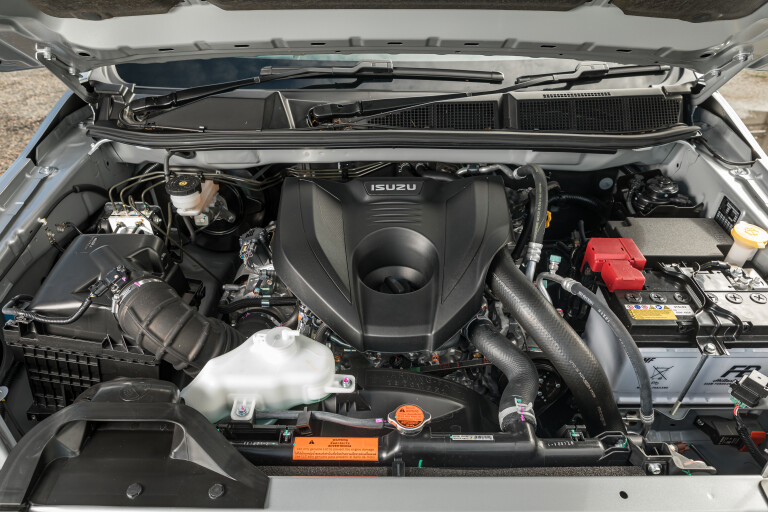
The D-Max still isn’t quiet, and you definitely know you’re driving a diesel, but it adds to the appeal and reminds you that it’s a work ute. Particularly this cab-chassis model with its tradie-focused alloy tray.
For ’22 the visual changes are minor, both inside and out, with most of the changes coming in the form of tech. As far as we could tell, the revised models are almost indistinguishable from last year’s equivalent models, although the cab-chassis LS-U we tested is a new model entirely.
The D-Max gets LEDs all round, comprising automatic Bi-LED headlights with auto-levelling and automatic high-beam control, DRLs, and LED taillights.
Its 18-inch machined-face alloy wheels are one of the better-looking options in this segment, fitted across multiple D-Max models, and on an alloy tray ute like this one, they’re a step up over steelies.
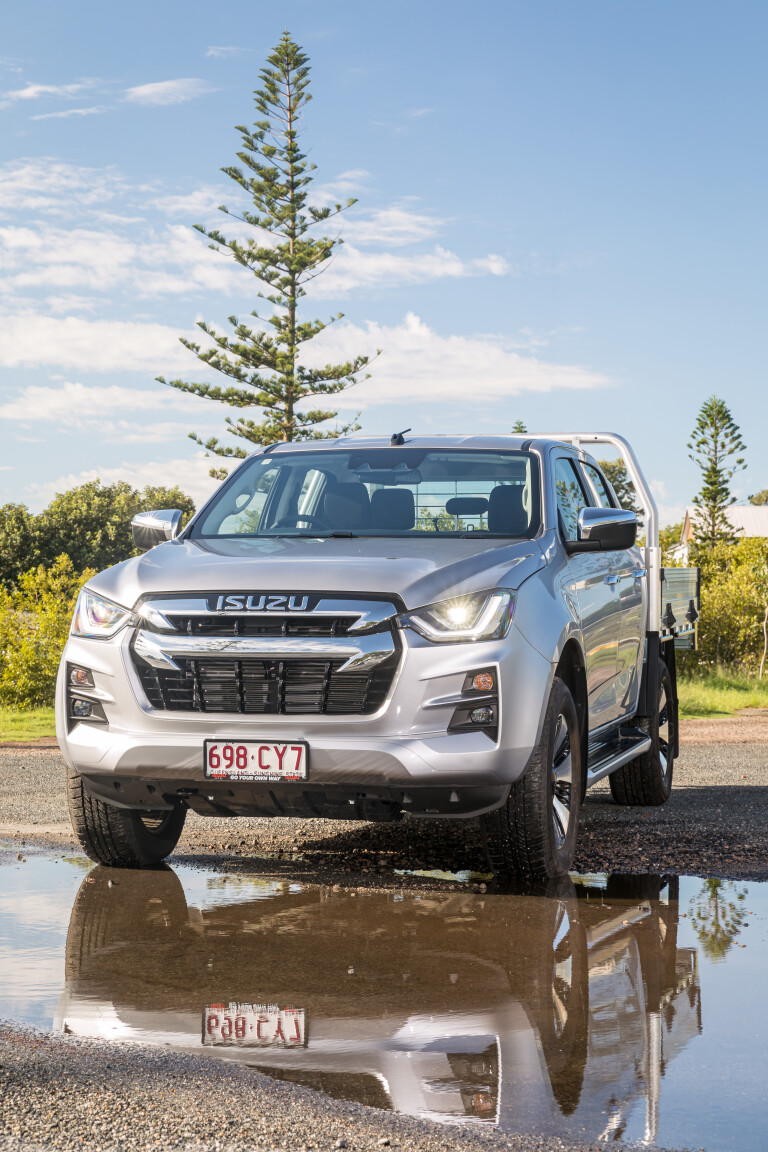
The interior looks much the same, with the signature D-Max side cup holders we love, plenty of in-cabin storage, a familiar dash and infotainment set-up, and all the controls are where they should be. The seats offer an impressive amount of bolstering – handy when thrashing around off-road – while remaining comfortable for long trips.
Overall finish is polished and appears to be hard-wearing with no flimsy trim pieces or delicate materials.
The cab-chassis we’re testing features an 1800mm-long alloy tray, available in steel if required, along with an increased GCM of 6000kg. The GCM increase doesn’t increase payload when you’re not towing, though, because GVM remains at 3100kg.
To break it down – the GCM increase improves payload while towing at, say, the maximum 3500kg braked towing capacity. With a kerb weight (including the heavy-duty alloy tray) of 2093kg, if you were to tow a 3500kg caravan for example, you’d be left with 407kg of payload. A factory standard tow bar receiver is also worth mentioning, while we’re on the topic of towing.
Manufacturers quite often hide behind impressive maximum braked towing capacity ratings while GCM lags, but Isuzu clearly intends for owners to use the D-Max to its full potential.
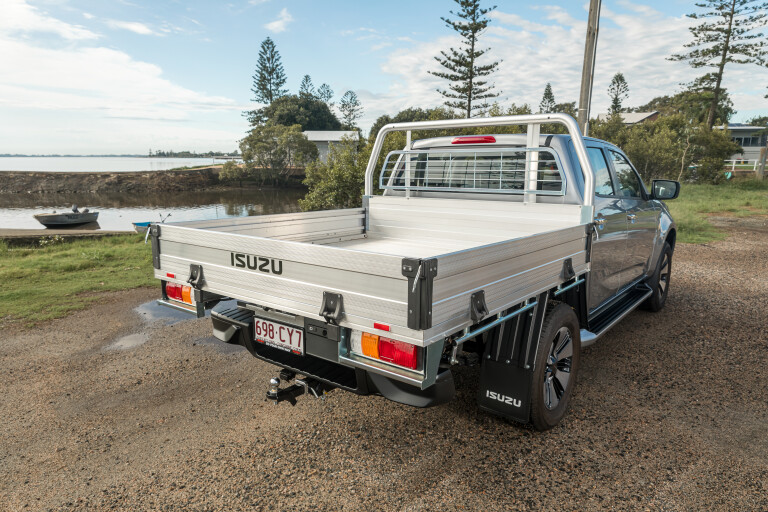
GCM rant aside, and in terms of what you can actually carry, payload for the D-Max LS-U Cab Chassis with the heavy-duty alloy tray fitted is 1007kg. Impressive given the LS-U luxury up front, and its 4x4 drivetrain. Yes, a 4x2 equivalent model will be capable of carrying a couple of hundred kegs more, but it won’t be off-road ready.
The Crew Cab Chassis 4x4 variants all receive heavy-duty three-leaf suspension over the standard set-up, which is pretty rough-riding without some weight over the rear axle.
It's quite likely this is a compromise resulting from the set-up being intended for carrying a decent weight. We didn’t have more than about 100kg in the tray at any one point, but I suspect a heftier load would significantly improve ride quality.
Off-road, while we sadly didn’t get a chance to engage four-wheel-drive, given the circumstances, this would undoubtedly excel much like any other latest-gen D-Max. Ground clearance (240mm), approach angle (30 degrees) and departure angle (20.6 degrees) are on par with other D-Max models, although departure angle does suffer ever so slightly with the alloy tray. The light tray and stiff springs may hinder grip slightly, but with a rear locking diff and a system we know works, it’d be a decent performer.
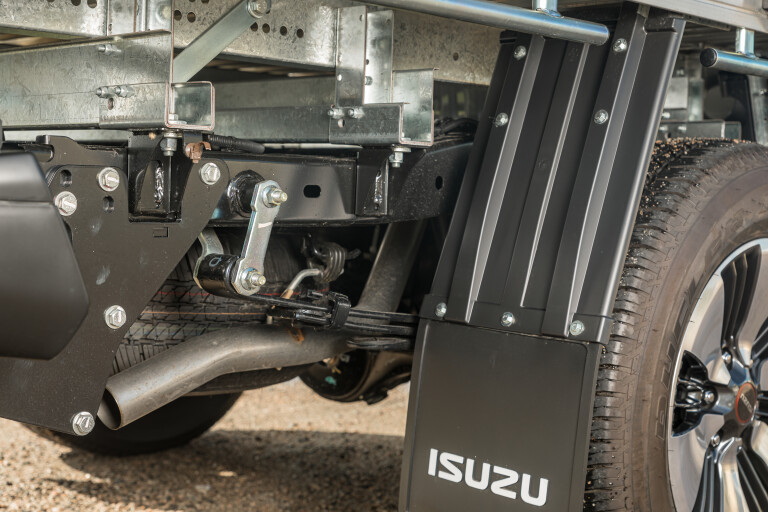
Tech is where the ’22 models score a bump, although the improvements are subtle. The addition of Smart Keyless Entry and Walk Away Door Lock are the first things we noticed, when the car automatically locked the doors. A true ‘leave your keys in your pocket’ system makes sense, negating the need to ever fumble for the keys while your hands are full.
Another subtle but handy addition is a Lane Support System switch on the steering wheel, which effectively turns off the driver-aid technology. Lane-keep assist, lane departure warning, lane departure prevention, and emergency lane-keeping are silenced with a two-second hold of the switch. Isuzu says the decision to add the switch came off the back of customer feedback, which makes sense because on too many modern vehicles, the D-Max included, it’s difficult to work out how to turn these sometimes intrusive systems off.
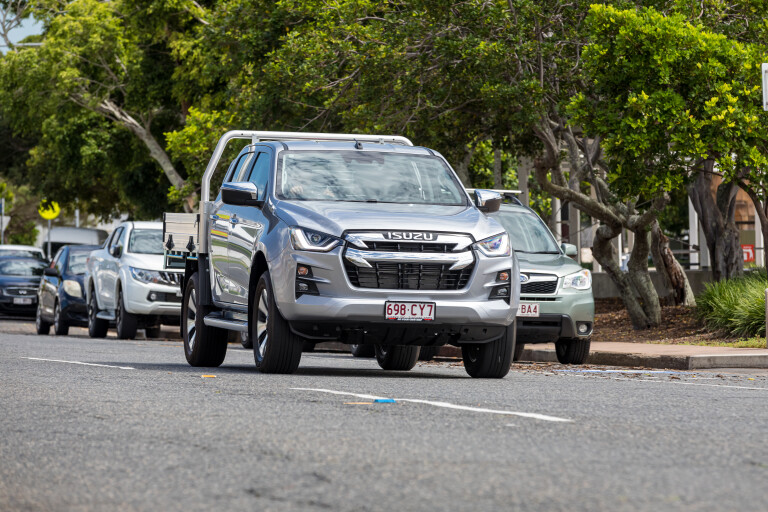
An auto-dimming rear vision mirror is standard now, too, although it’s one of those things that works so seamlessly that you don’t really notice it. The rain-sensing wipers are another bit of tech that you’ll notice fairly early on in the piece – if you use the wash-wipe that is. The screenwash comes from the wiper blade itself, rather than traditional bonnet mounted jets, which is great until you’re trying to wet a section of the windscreen not covered by the wipers.
In-cab tech includes a 9.0-inch infotainment system, with the same interface as last year’s model range, offering wireless Apple CarPlay and Android Auto, voice recognition, DAB+ radio and eight speakers. Wireless charging would be nice, but a good ol’ fashioned USB port keeps the juice flowing.
Tech is where the ’22 models score a bump, although the improvements are subtle
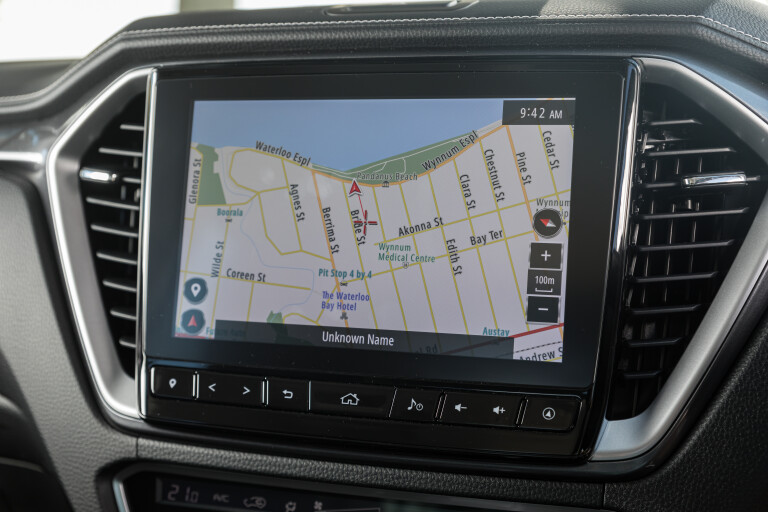
Isuzu’s Advanced Driver Assistance System (IDAS) is again standard across the range, offering an impressive suite of driver aids including autonomous emergency braking with turn assist, blind-spot monitoring, forward collision warning, adaptive cruise control, traffic sign recognition, blind-spot monitoring, rear cross-traffic alert, lane keep assist, lane departure warning and emergency lane keeping.
The lane-keep assist is helpful, rather than backseat driving constantly and the autonomous emergency braking also waits until it’s panic-brake time. I only know that because a Barina cut me off and very nearly caused an accident, with the AEB intervening right as I mashed the stop pedal myself. Safety systems always seem to err on the touchy side of things, so we feel Isuzu has nailed the balance with its IDAS features. The new lane support system switch allows you to turn them all off regardless, but we didn’t see a need to.
A five-star ANCAP safety rating carries over to the ’22 range, and all models in the D-Max line-up score eight airbags – even the 4x2 SX workhorse.
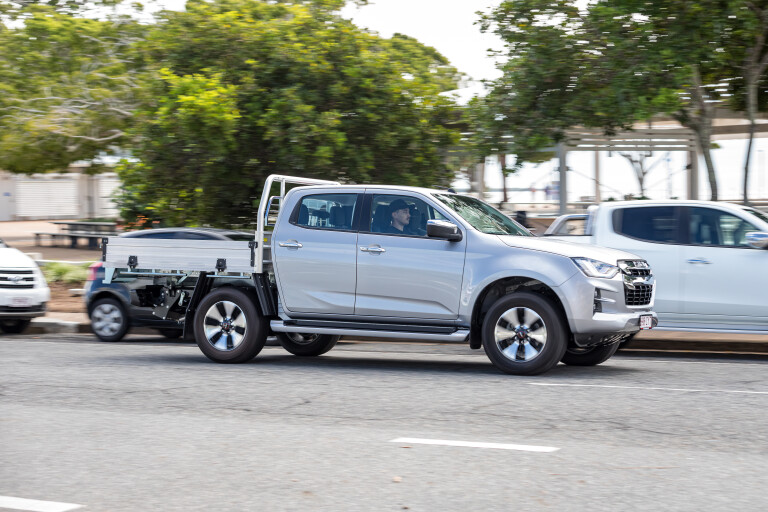
Around town, which is where this LS-U Crew Cab saw all of its testing, it’s a bit rougher than a regular LS-U with its heavy-duty rear end. In saying that, though, the alloy tray is quiet and doesn’t knock or clang around.
One downside of the alloy tray is visibility when parking. The reversing camera doesn’t give you a perfectly trustworthy indication of where the tray corners are, likely due to it protruding further than style trays, so using those mirrors is key.
For that one small downside, the tray design is fantastic. Ample side rail and inside tie-down points proved handy, as we opted for ropes rather than straps when testing. Yes, not ideal given the current rules, but ratchet straps soiled with river mud weren’t as suitable as a tried-and-true rope.
We managed 9.1L/100km across two weeks, with very little highway work slotted in. A pretty impressive average against Isuzu’s claimed 8.0L/100km
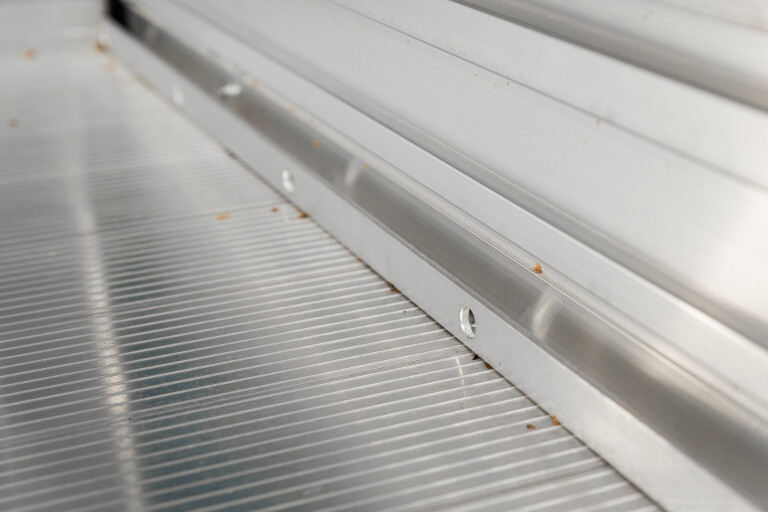
The 3.0-litre engine does drink when pushed, but its effortless pull means you rarely need to lean on it. It doesn’t overtake at highway speeds with as much haste as others in its class, but still has plenty of go. Around the city it’s punchy and, thanks to a fairly simple six-speed automatic and smooth power delivery, doesn’t trip over its feet trying to find the right gear.
We managed 9.1L/100km across two weeks, with very little highway work slotted in. A pretty impressive average against Isuzu’s claimed 8.0L/100km combined average, given the ute was on the run doing urban cleanup for the week of testing.
Steering is light at low speeds, but firms up to previous-gen D-Max levels by triple figures, and is an example of electric power steering done right. The old D-Max was great on the highway, but a bit of a workout everywhere else.
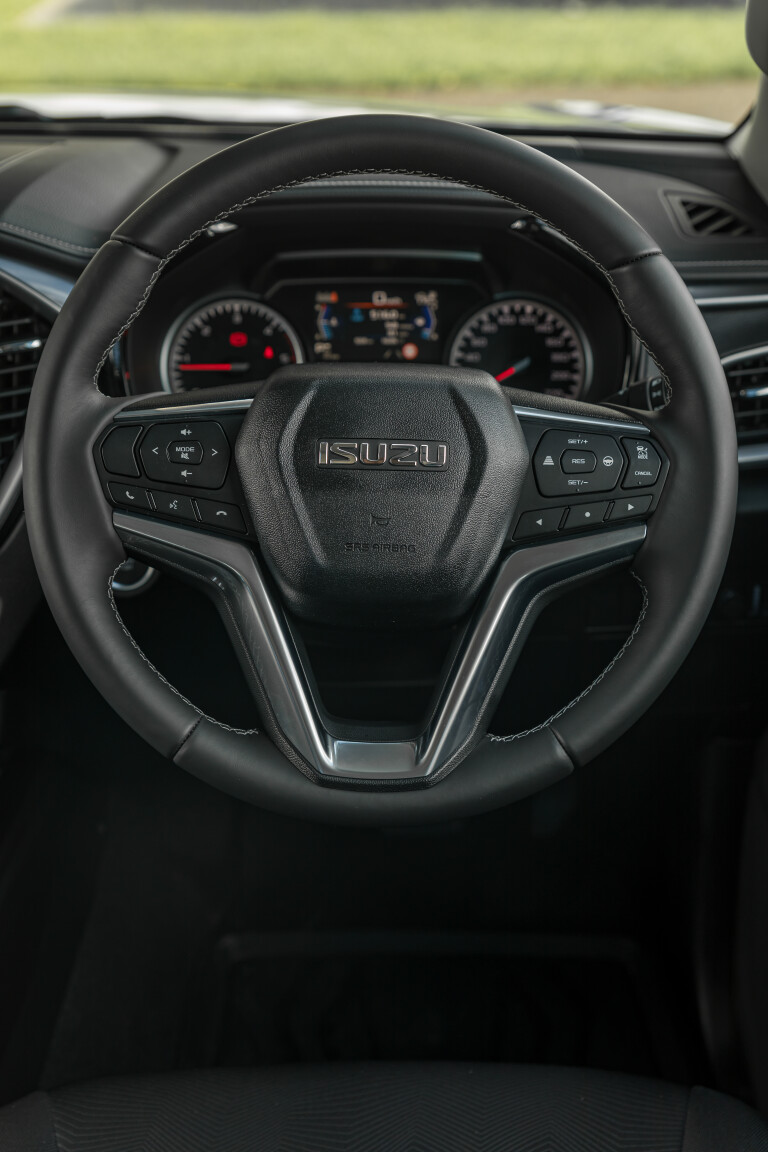
The wireless Apple CarPlay connected quickly and the familiar infotainment system proved yet again that a simple yet effective interface is best in a work ute.
It’s a shame we couldn’t test this Cab Chassis model off-road, but we’ll have to get it onto some dirt next time.
The as-tested price for this particular D-Max LS-U Cab Chassis is $68,882.54, consisting of the base price ($59,500), metallic paint ($650), heavy-duty alloy tray ($2,871), on-road costs ($4,418), tow bar wiring harness ($359), tow tongue kit ($195.80), electronic brake controller ($820), and stamp duty ($68.74). You’ve only got the option of an auto for this LS-U Cab Chassis model, so there are no savings to be had by changing gears yourself.
This is the D-Max option for those wanting a more rugged tray option, for work or play, but with all the luxury of the mid-spec LS-U model. It probably isn’t a huge chunk of the market, but there are plenty of tradies who would get more use out of this model than a style tray.
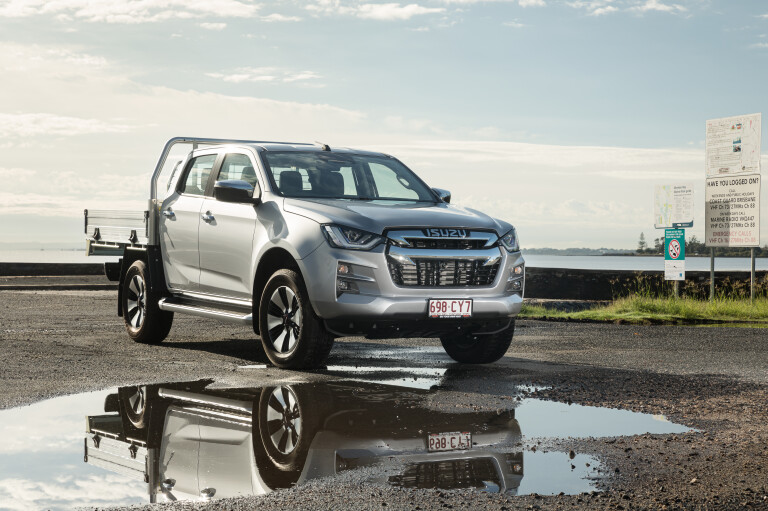
Isuzu has carried over its 'Service Plus 6-7-7' warranty offer, giving buyers a six-year, 150,000km warranty across the range, seven years of capped-price servicing, and up to seven years of roadside assistance when serviced through Isuzu Ute Australia’s dealer network.
Service time will roll around every 15,000km or 12 months, depending on which comes first, with the first 105,000km worth of capped price servicing coming in at $3513.
The ’22 LSU cab-chassis feels like the already good ’21 LS-U D-Max, but with a few welcome tech updates and a bit more of a rugged edge with the alloy tray. And on that, these updates were driven by customer feedback, which tells us Isuzu listens to its buyers.
If you’re a tradie or weekend handyman that wants luxury while maintaining a rugged alloy tray – one you won’t be afraid to dent or scratch – the LS-U Cab Chassis is a solid choice.
2022 Isuzu D-Max LS-U Crew Cab Chassis specifications
| Body | 4-door, 5-seat dual-cab ute |
|---|---|
| Drive | part-time four-wheel |
| Engine | 3.0-litre inline four-cylinder turbo-diesel |
| Power | 140kW @ 3600rpm |
| Torque | 450Nm @ 1600-2600rpm |
| Transmission | Six-speed automatic |
| Weight | 1960kg (not including tray) |
| L/W/H | 5285/1870/1805mm |
| Wheelbase | 3125mm |
| Track | 1570mm (f/r) |
| Ground clearance | 240mm |
| Turning circle | 12.5m |
| Tray length | 1800mm |
| Payload | 1140kg |
| Towing capacity (braked) | 3,500kg |
| Fuel tank capacity | 76L |
| Fuel consumption | 8.0L/100km (claimed); 9.1L/100km (tested) |
| Front suspension | independent coil springs (f); heavy-duty leaf springs (r) |
| Steering | electric assisted rack and pinion |
| Brakes | 320mm ventilated discs (f); drum brakes (r) |
| Wheels | 18-inch alloy wheels |
| Tyres | 265/60R18 Bridgestone 684II HT |
| Price | $59,500 (plus on-road costs) |
Score breakdown
Things we like
- Increased GCM
- Walk away door lock (key stays in pocket at all times now)
- LSU luxury with tough alloy tray
Not so much
- Reversing camera a bit vague with alloy tray corners
- Firm rear when unloaded

COMMENTS